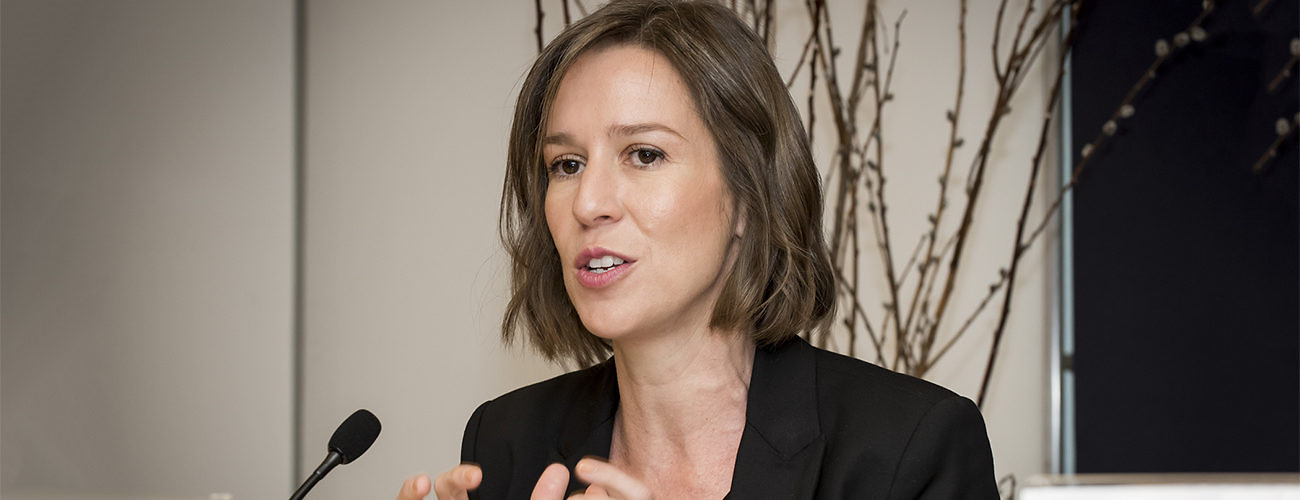“What’s needed is not more incrementalism,” declared Jeni Whalan, author of a new IPI report on sexual exploitation and abuse in UN Peacekeeping.
“Preventing SEA in peacekeeping and responding appropriately will not happen with business as usual reforms,” she said. “What’s needed are genuinely game changing efforts.”
Dr. Whalan was speaking to a September 11, 2017 IPI policy forum addressing the issue and elaborating on her report on the subject. The report analyzed the landmark UN Security Council Resolution 2272 adopted in March 2016 and its implementation, particularly its prevention and accountability measures.
Sarah Taylor, IPI Research Fellow, said while there had been an increasing emphasis on the centrality of a victim–centered approach, in practice there was “less attention to protection for survivors and witnesses, even a lack of basic information on what consequences perpetrators have faced, if any at all.”
She said, “As attention turned to how the UN system and how troop-and police-contributing countries can specifically address SEA, the victims have tended to get lost. There has been less attention and effort on services survivors require, on protection for survivors and witnesses, even an abject lack of information for survivors on what consequences the perpetrators have faced, if any.”
Dr. Taylor stressed the need to increase the number of women peacekeepers and people with “gender expertise.” But she coupled this recommendation with the warning that this is “not solely about recruiting and retaining more women in leadership posts.
“We must be careful not to place responsibility for changing the deeply institutionalized culture of impunity on appointed women. Instead, she said, “the focus should be on shifting institutions themselves so they’re more inclusive and responsive.”
IPI Senior Adviser Youssef Mahmoud, moderator of the event, underlined the gravity of the abuse to the entire UN. “Abuse of civilians under the UN flag not only undermines peacekeeping effectiveness but compromises the UN’s moral authority and credibility,” he said.
He highlighted three key areas of importance for the Secretary-General’s forthcoming senior-level meeting on the UN’s ongoing attempt to address this abuse – a continued focus on victims, the need for political and financial resources, and a robust approach to implementing Resolution 2272, including by repatriating troops that chronically commit these crimes
The event was co-sponsored by the Permanent Missions of Finland and the People’s Republic of Bangladesh.
“Member states must take responsibility to transform the UN system to address the reality of sexual exploitation and abuse in peacekeeping,” said Kai Sauer, the Finnish Permanent Representative. His Bangladeshi counterpart, Masud Bin Momen, stressed the importance of the victim-centered approach, “including within victims’ own families and communities.”
Jennifer Wittwer, a policy specialist at UN Women, said her office encouraged the use of its roster of experts instead of regular UN staff members in the documentation of gender-based violence. She said her office was also urging the creation of an independent UN mission office to have oversight and management of SEA complaints.
She also emphasized the need for more research on why the crimes of abuse are committed, which could help in prevention efforts.
Dr. Whalan lamented that much of the criticism of Resolution 2272 and the UN’s broader responses stemmed more from “concern with the UN’s reputation than concern for the survivors.” Despite this, she said she was persuaded that the UN “can walk and chew gum–can respond to the legitimacy crisis and the needs of the survivors.”
Noting that at the bottom of institutionalized sexual exploitation everywhere was “intense power disparity” between perpetrators and victims, UN peacekeeping abuse, she said, involved the exploitation of particularly vulnerable people. “It is difficult to imagine a relationship of greater power disparity than peacekeeper and child in a displaced persons camp, enmeshed in layers of poverty and social breakdown,” she said.
She concluded her comments with an appeal to the audience. “Game changing reform will require champions of change,” she said. “To you in this room, this is a call for sustained leadership. Let’s make sure there’s not cause to sit here again in 10 years, in 5 years, to tackle SEA by peacekeepers.”








